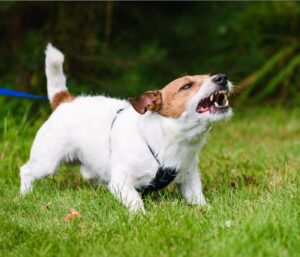Noise phobia is a widespread problem for dogs. Knowing where the problem is can be challenging since noise phobias can vary from subtle to severe.
That said, there are some noises that dogs tend to dislike most of all and which can make life a living hell for their owners if left untreated.
Here we’ll look at ten of those noises so you can help your dog overcome this annoying condition!
Sirens

Sirens are loud and high-pitched, making them a terrible dog idea. They can also be frightening to dogs because they don’t know what else is happening in the world at that moment.
Sirens can make dogs run away from home or bark and howl when they hear them. If you live near a road with frequent siren sounds (like police cars), it may be best to avoid bringing your dog outside if you know he’s scared of them!
Dogs might hide under beds when they hear sirens or try to escape from the noise—and this may cause them stress if there are other people around who might not understand why your dog is acting that way!
Loud music

You know that loud music can be stressful if you have a dog. Dogs cannot hear the same range of sounds as people do, so they’re more sensitive to higher frequencies.
This means that when your dog hears something like an orchestra playing at total volume, it’s not just his ears hurting—it’s his entire nervous system reacting to the stimulation.
Fireworks

Fireworks and other loud noises can be very stressful for dogs. That’s why, if you live near a fireworks display or have plans to attend one, you must ensure your canine companion has somewhere safe and quiet to hide.
If your dog is frightened by fireworks and needs medication, talk with your vet about the best treatment options.
Thrash metal

Thrash metal is music with a high tempo and distorted guitars played by a band. It’s loud, fast, and aggressive—and most importantly, it makes your dog nervous.
It’s easier to tame the thrashing monster in your home if you know what it sounds like!
Thunder

Whether it’s the sound of thunder or a loud bang, the first thing that comes to mind when you hear these words is likely to be your dog.
Dogs have been domesticated for thousands of years, which means they’ve lived alongside humans for quite a while—and as such, they’re naturally fearful of many things that other animals aren’t.
Because dogs depend on us for protection and security (and because we’ve conditioned them to fear loud noises), thunder triggers fear in them even more than it does in people. The best way to avoid this problem is by ensuring that your dog isn’t exposed to sudden loud noises at home!
Gunshots

Gunshots are loud and scary and can be a real problem for dogs. If your dog is afraid of gunshots, you should take them seriously. You can help desensitize your dog by exposing them to gunfire as often as possible.
Consider buying a shock collar or device that will make noise if the dog starts barking at something like gunfire or fireworks around the house.
This can help him get used to being around these things without being too scared!
Vacuums

Vacuums are one of the most common noises that scare dogs. A vacuum cleaner can be heard from anywhere in the house and it’s often a noise they’re forced to listen to while they’re home alone or with their owners away at work.
Although vacuums aren’t inherently wrong, they produce high-pitched sounds, which can irritate some dogs.
If you want your dog to get used to being around vacuums, try turning off the noise on your machine before ever using it again!
Construction Noises

Dogs are susceptible to noise, so construction noise is a big problem.
When you hear the loud sound of a jackhammer or sledgehammer, your dog may startle and become scared.
This can lead them to run away from the noise source or become aggressive towards people in general because they’re scared by everything happening around them.
You must train your puppy not to be scared by loud noises so that he doesn’t develop fear responses when there’s nothing wrong with him!
Crowds of People Talking at once or Parties

The noise and activity of a large crowd can be overwhelming for dogs. They may also need help understanding what people are saying, making it difficult to know whether they’re being friendly or mean.
Dogs are naturally curious, so crowds of people talking at once could cause them to become overwhelmed by all the information they’re trying to process.
Whistles or High Pitch Noises

Whistles are high-pitched noises that can be used in training to get your dog’s attention. A whistle is not necessarily a good thing to use on your dog. However, they may associate the whistle with being scared or hurt and become fearful of whistles in general.
Whistles can also be used as a training tool if you have an older dog who sometimes has trouble hearing commands. If you want them to sit or stay, for example, use a loud whistle, so it forces them into position instead of having them move towards you slowly because they want more affection!
How to Help Your Dog Overcome Noise Phobias?
You can help your dog overcome noise phobia by:
- It keeps the dog calm. Your best bet is to keep calm and make sure you don’t punish the dog for its reactions. It’s important not to try and force the animal into any situation where it may feel unsafe or uncomfortable; if your pet has a fear of some kind, it will naturally avoid situations where this fear is triggered.
- Bringing your pup somewhere quiet where there are no loud noises (say, inside). Sometimes just moving away from whatever kind of source is causing your pet anxiety will be enough for them to relax and stop panicking about it!
- If your dog is afraid of fireworks, try recording them. The noise will help them be less anxious about the real thing when it happens.
- If your pet has been through a traumatic experience, gradually desensitize them to the noise. Start by playing recordings of fireworks or storms in the background while they are eating or sleeping; over time, you can slowly increase the volume until it’s at its whole level.
- Please don’t force them into facing loud noises when they’re fearful of them; this could compound their fears instead! Instead, try finding ways around those triggers through gradual exposure therapy.
Play positive reinforcement CDs while training sessions with treats as rewards during desensitization exercises. Use a full-blast diffuser until they get used to how loud things get before turning down the setting manually (but wait to turn it off entirely until all signs point toward success!).
Conclusion
As you can see, there are many ways to help your dog overcome noise phobia. Remember that these things may not work 100% of the time, and it is important to try everything before resorting to using calming pheromones if they don’t seem like they are getting better on their own.
It is also important to remember that if you have a dog with noise phobia, it is your responsibility to ensure they are safe by taking them indoors when loud noises or fireworks are going off.




